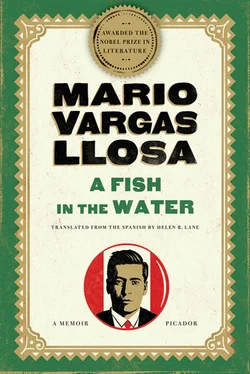Mario Vargas Llosa - A Fish in the Water - A Memoir
Здесь есть возможность читать онлайн «Mario Vargas Llosa - A Fish in the Water - A Memoir» весь текст электронной книги совершенно бесплатно (целиком полную версию без сокращений). В некоторых случаях можно слушать аудио, скачать через торрент в формате fb2 и присутствует краткое содержание. Год выпуска: 2015, Издательство: Macmillan, Жанр: Биографии и Мемуары, на английском языке. Описание произведения, (предисловие) а так же отзывы посетителей доступны на портале библиотеки ЛибКат.
- Название:A Fish in the Water: A Memoir
- Автор:
- Издательство:Macmillan
- Жанр:
- Год:2015
- ISBN:нет данных
- Рейтинг книги:3 / 5. Голосов: 1
-
Избранное:Добавить в избранное
- Отзывы:
-
Ваша оценка:
- 60
- 1
- 2
- 3
- 4
- 5
A Fish in the Water: A Memoir: краткое содержание, описание и аннотация
Предлагаем к чтению аннотацию, описание, краткое содержание или предисловие (зависит от того, что написал сам автор книги «A Fish in the Water: A Memoir»). Если вы не нашли необходимую информацию о книге — напишите в комментариях, мы постараемся отыскать её.
is a twofold book: a memoir of one of Latin America's most celebrated witers, beginning with his birth in 1936 in Arequipa, Peru; and the story of his organization of the reform movement which culminated in his bid for the Peruvian presidency in 1990.
A Fish in the Water: A Memoir — читать онлайн бесплатно полную книгу (весь текст) целиком
Ниже представлен текст книги, разбитый по страницам. Система сохранения места последней прочитанной страницы, позволяет с удобством читать онлайн бесплатно книгу «A Fish in the Water: A Memoir», без необходимости каждый раз заново искать на чём Вы остановились. Поставьте закладку, и сможете в любой момент перейти на страницу, на которой закончили чтение.
Интервал:
Закладка:
Those subterranean tensions and divisions were aggravated in Perú with the advent of Velasco’s dictatorship, which used racial prejudice and ethnic resentment in a quite explicit way in its propaganda campaigns to put a good face on the Velasco rule: his regime was that of mestizo and Indian Peruvians. He never managed to bring this off, since it never reached the point of taking root among the most underprivileged sectors, not even at the times when he carried out those populist reforms that aroused expectations in this part of the population — the nationalization of haciendas and businesses and state control of the oil industry — but some of that contentiousness, until then more or less repressed, surfaced and began to make its weight felt in public life in a more visible way than in days gone by, and to become tenser and more oppressive as, in large part because of those mistaken reforms, Perú became more impoverished still and fell even farther behind, and the economic imbalances between Peruvians increased. In the months of April and May 1990, all that suddenly overflowed, like a stream of mud, into the electoral contest.
Certain of my supporters, as I have already said, were the first to commit the error of openly giving proof of racist attitudes, and therefore I had been obliged, on the night of April 9, to remind those who shouted racist slogans in chorus at the doors to my house that Fujimori was as Peruvian as I was. When Fujimori, during his unexpected visit on the following morning, thanked me for having done so, I told him that we ought to try to make the subject of race disappear from the campaign, inasmuch as it was an explosive one in a country as violent as Peru. He assured me that he shared that belief. But in the weeks to come he resorted to the subject of race, to his benefit.
Since, on reopening the campaign, there were still reports of incidents in which Asians were the object of mistreatment or insults, in the second half of April I engaged in many gestures meant to demonstrate my rapprochement and solidarity with the Nisei community. I met with leaders of it, within the Freedom Movement, on April 20 and 25, and summoned the press on both occasions in order to condemn every sort of discrimination in a country that was lucky enough to be a crossroads of races and cultures. On that same April 20, I spoke with all the reporters and correspondents hastily sent from Tokyo to cover the second runoff election, in which, for the first time in history, a Nisei might become the head of state of a country outside Japan.
The Japanese colony published a communiqué on May 16, protesting against the racist incidents and emphatically stating that it had not sided as a group with either of the two candidates, and the Japanese ambassador, Masaki Seo — who had proved to be extremely cordial to me and to the Democratic Front — also made a statement denying that his country had made promises to any candidate. (Fujimori had been hinting that if he were elected gifts and credits from Japan would rain down on Peru.)
I believed that, in the light of all this, the subject of race would gradually fade away and that the electoral debate could focus on the two subjects in which I held an advantage: the Plan for Governing and the Program for Social Aid.
But the racial subject had poked only its head out. Soon its whole body would take part in the wrestling match, now pushed into the arena through the main entry by my adversary. On the pretext of protesting against racial discrimination, beginning with his first public rally, Fujimori began to repeat what would be the leitmotif of his campaign from that time on: that of “ el chinito y los quatro cholitos ,” the little Oriental and the four little mestizos. That is what the Vargasllosistas thought his candidacy represented; but they were not ashamed of being the same thing as millions and millions of Peruvians: chinitos, cholitos, indiecitos, negritos . Was it fair that Peru should belong only to blanquitos? Peru belonged to chinitos like him and to cholitos like the first vice president on his ticket. And then he introduced the likable Máximo San Román, who with his arms upraised showed the audience his strong Indian face of a cholo from Cuzco. When I was shown the video of a rally in Villa El Salvador on May 9, in which Fujimori used the racial subject in this undisguised way — he had already done the same thing before, in Tacna — defining the electoral contest before a crowd of impoverished Indians and cholos from the city’s squatter slums as a confrontation between whites and coloreds, I greatly regretted it, for stirring up racial prejudice in that way meant playing with fire, but I thought that it was going to bring him good results at the polls. Rancor, resentment, frustration of people exploited and marginalized for centuries, who saw the white man as someone who was powerful and an exploiter, could be wondrously well manipulated by a demagogue, if he continually repeated something that, moreover, had an apparent basis in fact: my candidacy had seemed to enjoy the support of the “whites” of Peru en bloc.
In this way, the racial theme assumed a central place in the campaign. That racist tactic managed to make my own partisans feel out of place and cause them to experience some very uncomfortable moments. I remember having seen an interview on TV with one of the leaders of Popular Action, Jaime de Althaus, who was working on the committee for the Plan for Governing and was minister of agriculture in the cabinet proposed by Lucho Bustamante and Raúl Salazar, defending himself from the charge of a Channel 5 journalist that my candidacy was that of the whites, and pointing out that various leaders of ours were mestizos, of very humble origins, and with skin as dark as that of any Fujimorista. Jaime seemed to be trying to apologize for his having fair hair and blue eyes.
If we followed that route, we were lost. It goes without saying that, if it was a question of that, we could have shown that not only were there whites in the Front but hundreds of thousands of dark-skinned Peruvians, of every racial background imaginable. But it was not a question of that , and to me prejudices against a Japanese or an Indian Peruvian were as repugnant as those against a white Peruvian, and I said as much every time that I found myself forced to mention the subject. It could not be brushed to one side of the campaign now and an undetermined number — though I think it was a high percentage — of voters were sensitive to it, feeling that, by voting for a yellow man against a white one (that is what it appears that I am, in the mosaic of Peruvian races), they were engaging in an act of ethnic solidarity and retaliation.
If the electoral campaign had been a dirty one in the first round, it was now an obscene one. Thanks to spontaneous reports that reached us from different sources, and to verifications made by the people of the Democratic Front themselves or by reporters and media that backed my candidacy, such as the daily papers Expreso, El Comercio , and Ojo , Channel 4, the magazine Oiga , and above all César Hildebrandt’s television program “En Persona” (“In Person”), the mystery surrounding the person of agricultural engineer Fujimori Fujimori began to fade. A reality quite different from the mythological one with which he had been invested by the communications media controlled by the APRA and the left began to emerge. For one thing, the “candidate of the poor” was not at all poor and enjoyed an estate considerably more substantial than mine, judging from the dozens of houses and buildings he owned, had bought, sold, and resold in the last few years, in different districts of Lima, understating their worth in the Property Registry so as to lower his income tax payments, as had been proved by the independent congressman Fernando Olivera, who had made the fight for morality in politics the warhorse of his entire term in office and who for that reason instituted criminal proceedings against the candidate of Cambio 90 before the 32nd District Tax Court for “tax fraud and betraying public faith,” which, naturally, didn’t get anywhere. *
Читать дальшеИнтервал:
Закладка:
Похожие книги на «A Fish in the Water: A Memoir»
Представляем Вашему вниманию похожие книги на «A Fish in the Water: A Memoir» списком для выбора. Мы отобрали схожую по названию и смыслу литературу в надежде предоставить читателям больше вариантов отыскать новые, интересные, ещё непрочитанные произведения.
Обсуждение, отзывы о книге «A Fish in the Water: A Memoir» и просто собственные мнения читателей. Оставьте ваши комментарии, напишите, что Вы думаете о произведении, его смысле или главных героях. Укажите что конкретно понравилось, а что нет, и почему Вы так считаете.












